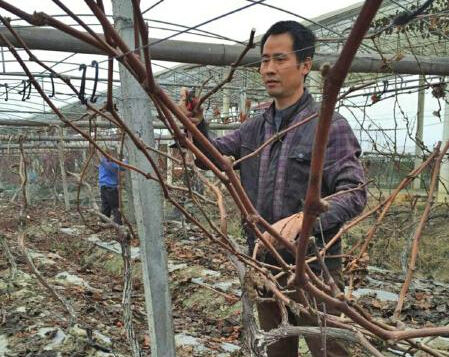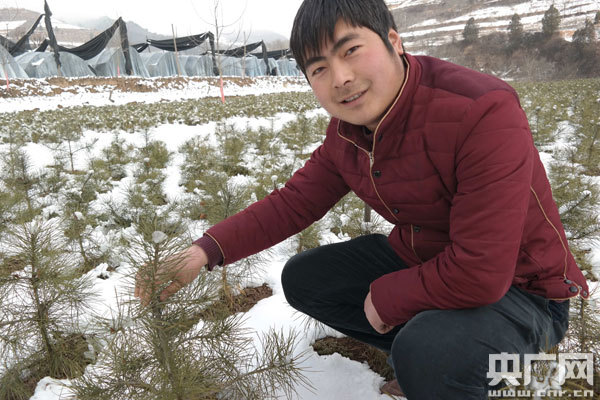The annual profit of returning to their hometown to grow red oysters and become rich reaches one million yuan.

Chen Weihong works in the vineyard.
Chen Weihong, 48, who was born and raised in Fangxing Town, Xinjin County, Chengdu, is a capable person in everyone's eyes. He led everyone to grow high-end grapes and ecological vegetables, which were sold to supermarkets in Beijing, Xizang, Chongqing and Sichuan. At the beginning of every year, well-known supermarkets such as Ito and Yonghui will take the initiative to find Chen Weihong and sign supply orders for the whole year. Over the course of a year, he made a profit of nearly 2 million yuan selling vegetables and fruits.
The vegetable market found the business opportunity and resolutely quit his job and went back to his hometown to start a business.
"now it seems that business is on track, but when I just came back to start a business, I still suffered a lot." When it comes to the history of entrepreneurship, Chen Weihong feels that there is no shortcut. In the 1990s, unwilling to be a farmer all his life, he went to Guangdong to work as the hardest and most tiring handyman on a construction site.
Once, he went shopping with the foreman and found a business opportunity in the vegetable market. "the price of green ecological vegetables on the market is twice as expensive as ordinary vegetables, but there are still a lot of people who buy them." Chen Weihong immediately made an appointment with a fellow villager and rushed back to Xinjin to do market research, and found that it was very promising, so she resolutely decided to go back to her hometown to start a business.
He was pushed to the citizen's dinner table by him when no one was interested.
"in the past, red roe tips were used to feed pigs in the countryside, but no one ate them. After our promotion over the years, we not only eat cold salad, hot pot is also very popular. " Chen Weihong said that she had made the right bet when she pushed the tip of the red steak, which had not been visited before, to the dining table of the citizens.
In 2003, Chen Weihong found that one of the varieties he planted was only pointed, not too long-rooted, smelled fragrant and tasted crisp. He sent the red turnip tip to the testing department for nutrition testing and found that it had higher nutritional value and better taste than some daily vegetables on the market. And through his improvement, the picking period can be as long as three seasons (March-November), and thousands of kilograms can be picked per mu.
Immediately, Chen Weihong began to try to sell red vetch tip. Every day, in addition to selling at the county vegetable market, he also rode a motorcycle to send the newly picked red rice tips to hotels, restaurants and supermarkets in Chengdu for promotion. At first, he was shut out a lot, so he simply gave it to hotels and restaurants for free, so that they could taste it first.
Three months later, his red gourd tip from no one to sell better and better, from door-to-door sales to market wholesale, from the vegetable market directly into the Chengdu supermarket. With the first taste of the joy of success, Chen Weihong expanded the planting scale of Hongqian, broadened the sales channels, and became a well-known grower.
Take the villagers to get rich and increase their annual per capita income by 20,000 yuan.
Now, the planting area of Hongqian has expanded from more than 500mu to more than 1000 mu, with an annual output value of more than 6 million yuan and a profit of 1 million yuan. In addition, the grapes he grows are in short supply at the Chengdu Chimaqiao Wholesale Market, and some wholesalers can't wait to go to the grape base to pick them. Huangti Market can sell 15 yuan per jin, Heiti can sell 20 yuan per jin. This year, it is estimated that the lowest output value will reach 5 million yuan, with a profit of nearly one million yuan.
His farm absorbed more than 400 workers and 200-300 temporary workers, of whom 40-50 years old accounted for more than 80% of the total, older women accounted for more than 70% of the total labor force, the average wage reached more than 2000 yuan, and the per capita income of local villagers increased by 20, 000 yuan a year.
- Prev

"small seedlings" make "big industry" Gansu Liangdang Lingguan embark on the road to prosperity
"small seedlings" make "big industry" Gansu Liangdang Lingguan embark on the road to prosperity
- Next

Inspirational Road for successful Entrepreneurship of Peasant Workers in Sichuan
Inspirational Road for successful Entrepreneurship of Peasant Workers in Sichuan
Related
- A course of planting techniques and methods on how to grow carrots
- How to plant the latest tulips?
- Is it better to pick tea in the morning or in the afternoon? When is the best time for tea to be picked? what is the third or fifth tea?
- Launch Yuanxiao Happy combination Haocha + Tea Yuan healthy Taste
- Penghu Tourism "Fireworks 20 Parade with You"
- 2022 West Lake Happiness holds "Digital Revitalization Voucher" and draws iphone13 and laptop.
- Banqiao Fuzhou social houses are designed to change start-up combined with police elimination to create a safe and livable environment
- The convenient measure of "mechanical weeding" in Xinbei has been abused and the Agriculture Bureau has imposed heavy penalties on the illegal land consolidation.
- Changgeng University Joins Hands with Four Memory Factories to Rescue Memory Talent Shortage
- The list of Taiwan's top 100 MVP managers is listed by the Director-General of the Farmers' Association of Sanxia District.

